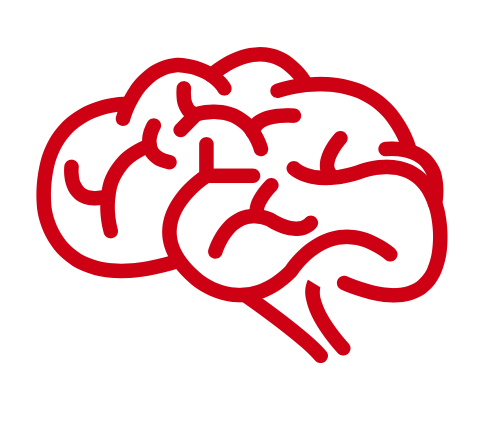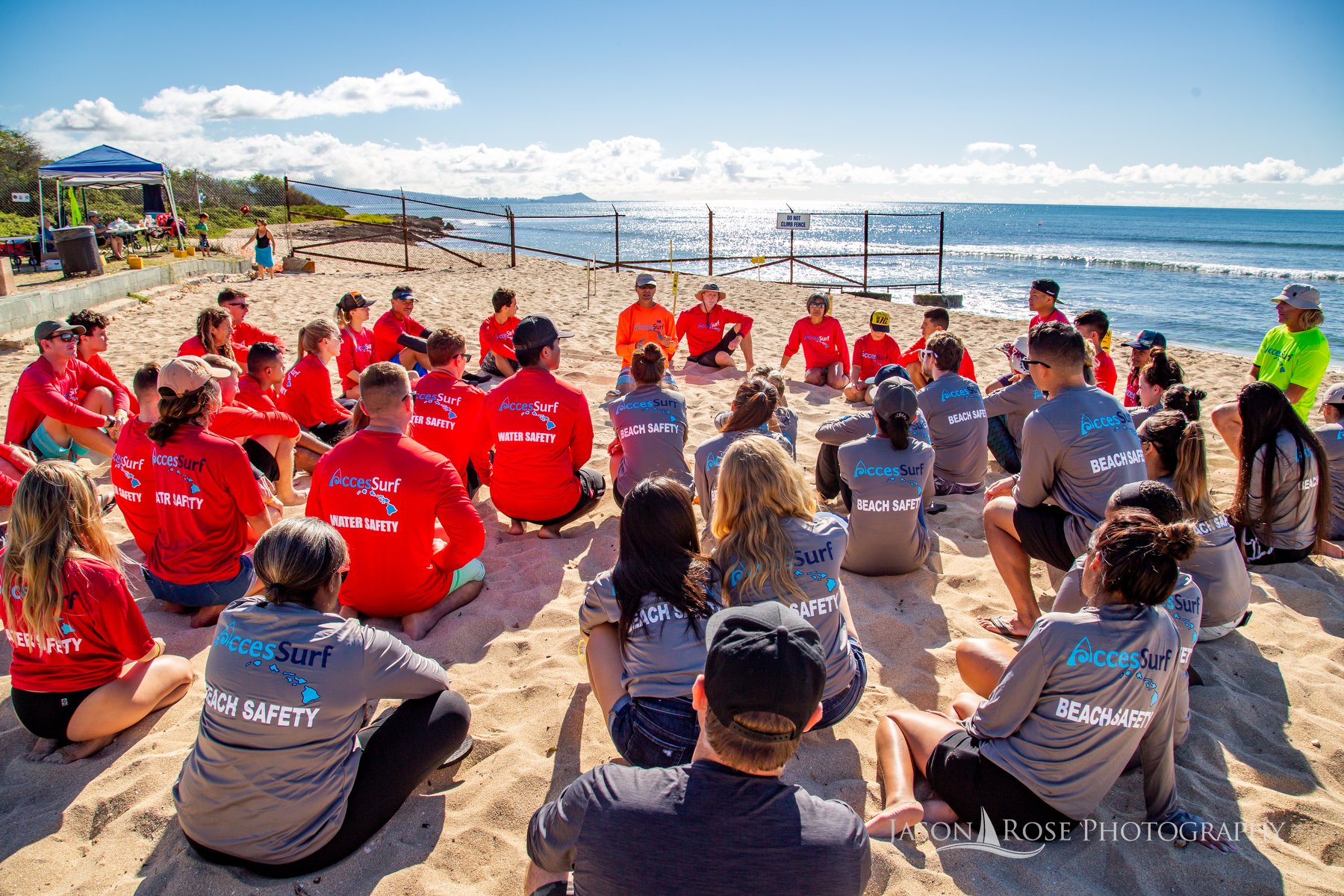This section is designed to help you better understand how Cognition can affect a person’s performance on the beach or in the water.
What is Cognition?
Cognition is a term that refers to the mental process of thinking, knowing, learning and understanding.
Throughout this section we will learn about cognition and how it relates to safely awareness and problem-solving at the beach.

Cognitive disabilities may involve difficulties or deficits involving safety-awareness, problem-solving, processing speed, attention, memory, visual and verbal comprehension.
Cognitive difficulties can significantly affect a person’s performance in and out of the water.
How Can Cognition Affect Someone?
When someone has a cognitive disability they might have challenges with:
- Safety awareness
- Attention
- Processing speed
- Problem solving
- Memory
Beach Safety
Before we dive into safety awareness, let’s talk about basic beach safety
- There will always be a Lifeguard at the beach and a majority of the AccesSurf Key Leaders are first aid certified.
- Remember the Safety Hand Signals

Beach and Water Safety
Top things to remember:
- Swim and surf in the designated areas
- Always go out with a buddy – there will be a lot of us out there so look around for those AccesSurf rash guards
- Avoid areas of fast-moving water or rip currents
- Never turn your back to the ocean
- Stay within your fitness and swimming capabilities. If you don’t feel comfortable, let one of the key leaders know. There are plenty of other opportunities for you to showcase your skills/talents.
What is Safety Awareness?
Safety awareness mean that a person is aware of their abilities and understands their strengths and weaknesses within a given environment or activity.
People with poor safely-awareness have difficulties identify their strengths and weaknesses.
Let’s Meet Sarah
Sarah is a 17-year-old girl who has Autism Spectrum Disorder. She has poor safety awareness and poor judgment. Sarah’s dream is to surf; however, she has never been in the ocean. Sarah believes that she doesn’t need a PFD and that she can go out alone.
How could you handle this situation? How can we make her experience SAFE and FUN?
How can I Help an Athletes Like Sarah?
- Make safety 1st:
- Make sure she is wearing her PFD and leash correctly
- Work as a team:
- You can say ”Sarah I need your help catching some waves, let’s be Surfing Buddies today” or “We are going to catch so many waves together”
- It’s a good idea to have a extra surf instructor with you
- Set realistic expectations:
- Sarah might not be able to paddle out past the break, but she could try and paddle with a surf instructor ”Surf Buddy” on her board.

Attention
- Attention is another factor that can affect a person safety awareness at the beach.
- Attention is when a person can keep their mind focused on something.
- Focus challenges are real. It doesn’t mean that an athlete isn’t working hard or isn’t intelligent or isn’t interested in what you are saying.
- We all have difficulties paying attention at times, but at the beach and in the water it is essential to be hyper-aware and pay attention.
How Can Attention Affects a Day at the Beach?
Let’s say you have an athlete that becomes confused and frustrated while attempting to hold his surfboard and put on his leash at the same time.
Or
You have a child who starts to buckle her PFD and suddenly stops and starts strapping on her leash, and forgets to complete and return to buckling her PFD before going out.
These are all safety concerns due to a lack of safety awareness and attention.
How can you help?
You Can Help Your Athlete With Attention Difficulties By:
- Breaking down the task into smaller steps
- Provide verbal and visual demonstration
- Don’t just tell them how to paddle, show then how to
- Remind them to take one step at a time. Coach them through the task
- “1st we are going to buckle the PFD straps; then we will put on our leash.”
- Limiting distraction is a great way to help:
- The beach can be distracting but try and find a quiet area
- Someone with attention issues might have difficulty holding a train of thought when they’re interrupted, so give them time, let them finish their thought
- If you notice that your athlete is not paying attention out on the water, the 1st priority isn’t catching a wave, it is to “re-center” them. Get close to your athlete, make eye contact, and repeat your plan ”First we paddle, then we will catch ONE wave together”
Processing Speed
- Processing speed is highly essential for safety awareness.
- Processing speed is the pace at which you take in information, make sense of it, and begin to respond. This information can be visual, such as letters and numbers. It can also be auditory, such as spoken language.
- Having slow processing speed has nothing to do with how smart a person is —it deals with how fast a person can take in and use information.
Problem-Solving
- Sometimes people with problem-solving difficulties can’t:
- Recognize a problem exists
- Determine possible solutions
- Or how to solve it.
Processing Speed and Problem-Solving
- Processing Speed and Problem-Solving can go hand in hand
- The longer it takes someone to process information (such as a big wave coming at them), the longer it takes them to problem solve and respond to situations (such as paddle faster or do a Turtle Roll maneuver)
How can I Help?
- Less is more:
- Saying too many words at once can create challenges for someone with slow processing speed
- Use fewer words.
- You can verbally prepare them:
- ”Here comes a big wave”
- Give simple one-step directions:
- “Paddle”
Memory
- Memory refers to how we store and retrieve information.
- A person with memory challenges might have trouble remembering faces, names, who they are, where they are, why they are there or what time it is.
- You will be informed that your athlete has memory issues before you meet them. If your athlete seems confused about their situation just kindly reminded them, ”Mr. S you are at White Plains beach with AccesSurf.”
- If you were not informed beforehand that your athlete has memory issues and while out on the water or on the beach they display memory problems, let a Key Leader know. This could be signs of a serious medical episode
Errorless Learning
Errorless learning is a technique that helps people reduce errors, which allows them to complete the tasks accurately.
How to do Errorless learning:
- Lead by example: model the behavior you wish to see
- Provided step by step verbal and visual cues on how to complete a task
- Have your athlete recall information or complete the task (correctly) many times
- Break down the tasks into smaller steps
Some Conditions That Might Affect Cognition
- Stroke
- Autism Spectrum Disorder
- Traumatic or Acquired brain injury
- Dementia
- Intellectual developmental disorder
- Williams syndrome
- Down syndrome
- Fragile X syndrome

